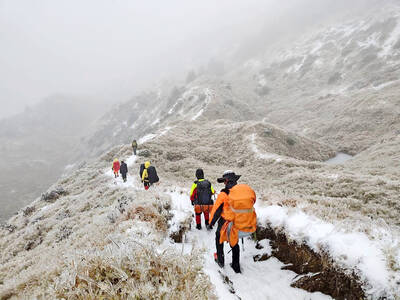Democratic Progressive Party Chairperson Tsai Ing-wen (蔡英文) yesterday called for a change in the legislative system to break what she called the monopoly of large political parties and a change in the Referendum Act (公民投票法) to allow more direct democracy, as she attributed the 23-day occupation of the legislative floor earlier this year to a failure of representative democracy.
“For those who are concerned about the development of democracy, this year is a very exciting year, and if we put the year in Taiwan’s history of democratic development, it’s also a turning point, for the Sunflower movement that occurred in March shocked not only Taiwanese society, but also the international community,” Tsai said during a keynote speech at a conference in Taipei marking the 50th anniversary of the Declaration of Formosan Self-Salvation.
“I am more than glad to see the courage that the youth in Taiwan demonstrated when the values of democracy are being trampled, it’s the same courage as when Peng Ming-min (彭明敏) and his two students drafted the declaration 50 years ago,” she said.
Tsai was referring to the manifesto drafted by Peng, who was a political science professor at National Taiwan University at the time, and two of his two students, Hsieh Tsung-min (謝聰敏) and Wei Ting-chao (魏廷朝), that aimed to mobilize Taiwanese to overthrow Chiang Kai-shek (蔣介石) and his Chinese Nationalist Party (KMT) regime in September 1964.
Secret agents discovered their actions and arrested the three a day before they were to distribute copies of the declaration; they were later prosecuted and imprisoned.
Due to pressure from human rights advocacy groups worldwide, including Amnesty International, Chiang granted amnesty to Peng in 1965, and placed him under house arrest.
In 1970, Peng fled Taiwan and sought political asylum in Sweden. He later lived in exile in the US until November 1992.
Tsai said that although the political environment has improved considerably since the time when the declaration was drafted, democracy in Taiwan still faces obstacles, such as the failure of the legislature to represent the public.
“In recent years, we have often seen the government making policy decisions that go against the opinion of the majority of the people, for example, the government’s decision on the Fourth Nuclear Power Plant and the cross-strait services trade agreement,” she said.
“The legislature is in the hands of the majority party, and often, it’s the will of the ruling party triumphing over the people’s will,” she said.
“When the party’s will is more important than the people’s will, we know there’s something wrong with our representative democracy,” she added.
Therefore, Tsai proposed to revise the Constitution to change the legislative system that she said allows only large political parties to survive, so that “the number of seats and its composition could better reflect social diversity.”
She also urged revisions to the Referendum Act, which has high thresholds before a referendum proposal can make it to voting booths, to facilitate direct democracy.
On the economy, Tsai said that while it is difficult to ignore China as an economic partner, over-dependency on China could precipitate a crisis, and that Taiwan should boost domestic consumption while developing more diverse international trade relations.

Trips for more than 100,000 international and domestic air travelers could be disrupted as China launches a military exercise around Taiwan today, Taiwan’s Civil Aviation Administration (CAA) said yesterday. The exercise could affect nearly 900 flights scheduled to enter the Taipei Flight Information Region (FIR) during the exercise window, it added. A notice issued by the Chinese Civil Aviation Administration showed there would be seven temporary zones around the Taiwan Strait which would be used for live-fire exercises, lasting from 8am to 6pm today. All aircraft are prohibited from entering during exercise, it says. Taipei FIR has 14 international air routes and

The Ministry of National Defense (MND) today released images of the military tracking China’s People's Liberation Army (PLA) movements during the latest round of Chinese drills around Taiwan. The PLA began "Justice Mission 2025" drills today, carrying out live-fire drills, simulated strikes on land and maritime targets, and exercises to blockade the nation's main ports. The exercises are to continue tomorrow, with the PLA announcing sea and air space restrictions for five zones around Taiwan for 10 hours starting from 8:30am. The ministry today released images showing a Chinese J-16 fighter jet tracked by a F-16V Block 20 jet and the

Snow fell on Yushan (Jade Mountain, 玉山) yesterday morning as a continental cold air mass sent temperatures below freezing on Taiwan’s tallest peak, the Central Weather Administration (CWA) said. Snowflakes were seen on Yushan’s north peak from 6:28am to 6:38am, but they did not fully cover the ground and no accumulation was recorded, the CWA said. As of 7:42am, the lowest temperature recorded across Taiwan was minus-5.5°C at Yushan’s Fengkou observatory and minus-4.7°C at the Yushan observatory, CWA data showed. On Hehuanshan (合歡山) in Nantou County, a low of 1.3°C was recorded at 6:39pm, when ice pellets fell at Songsyue Lodge (松雪樓), a

NO SHAME IN RETREAT: Hikers should consider turning back if the weather turns bad or if they do not have sufficient equipment, the Taroko park headquarters said Two people died of hypothermia over the weekend while hiking on Hsuehshan (雪山), prompting park authorities to remind hikers to bring proper equipment and consider their physical condition before setting out in the cold weather. Temperatures dropped over the weekend, bringing snow to high altitudes in Shei-pa National Park. One hiker, surnamed Lin (林), who on Friday was traveling with a group of six along the Hsuehshan west ridge trail, lost consciousness due to hypothermia and died, the Shei-pa National Park Headquarters said. On Saturday, another hiker, surnamed Tien (田), in a group of five on the southeast of the west